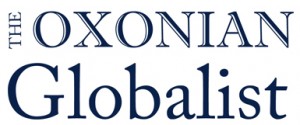Saint-Simon’s Promise

Pauline Fredrick as Potiphar’s Wife Over A Crystal Ball: just because she can see it doesn’t mean she understands it. Photo by The Library of Congress via Flickr.
Welcome to the Happiness Factory
We are in the Shanghai Coca-Cola factory. The woman is wearing a beige suit. After correcting some wrinkles around the lapels she takes her place behind a red podium. Everything comes down to numbers. She tells us how many millions live in Shanghai, how many millions have cell phones, and finally, how many million consume Coca-Cola products. Millions, millions, millions.
There are Coca-Cola banners everywhere, reminding us that we are in one of the world’s “happiness factories”. Happiness: the theme is ubiquitous. It can be found, we are told, at the bottom of one of these glass bottles. I grew up to see Coke as the symbol of gross overconsumption. Here, however, all appears simple, clean, and efficient. One sip and your thirst is quenched.
The woman in the beige suit begins to talk to us about China’s changing economic situation. Within five minutes she is telling us about the end of China’s Five-Year plan. “We operate in a community. Only the community can survive, to keep the companies alive. What about our consumer? 80% of consumers care about environmental issues. 83% are willing to pay higher prices. We must also empower the community to grow so that we may grow as well. For instance, Coke will empower women with opportunities, so they can become a major force in the country.” Is this the humanitarianism of the future, obviously and unapologetically motivated by the thirst for profit?
Anatomy of the prophet
We can learn much about the society we inhabit from its utopian fantasies. These are often the offspring of theories concocted by philosophers who wish to improve the world so that it may better accommodate their ideals. Nonetheless, this is not enough for one to become the “prophet” of an age. In biblical times, a prophet was thought to have been drawn into contact with the divine to do more than promote a vision of salvation. They were sent to speak the truth about mankind, as unpopular as it may be. Some spoke a truth so resonant that it would stay relevant for generations, even centuries to come. Of all those who could be considered prophets of our age, Henri de Saint-Simon exhibits a formidable prescience.
Although Saint-Simon was born to family of French aristocrats, his name would come to signify a school of thought far removed from the feudal system and military values his ancestors stood for. Rather, he would devote his life to the promotion of a technocracy sustained by a strict meritocracy; it was not enough to reform society from the inside, for we needed a completely different society. Having been imprisoned for counter-revolutionary activities during the French Revolution, Saint-Simon also knew the risks posed by violent revolution. His revolution would not be accomplished by the guillotine but by industrialisation and science.
Saint-Simon and his followers did not perceive “petit” capitalists as exploiters of labour, owners of capital, or accumulators of profit on a continuous rise through the ranks of the bourgeoisie. Much to the contrary, it was the aristocracy that exploited both workers and small capitalists with rent payments and interest, hindering productivity and perpetuating widespread deprivation and suffering amongst both classes. Hence, according to Saint-Simon, the small capitalists and workers shared an interest in the expansion of credit and association, permitting workers to open their own cooperative workshops while the industrialists increased their production.
All this, believed Saint-Simon, could be done in a system governed by a creative and industrious elite. Like the businesswoman in the Coca Cola factory, Saint-Simon believed that society should be organised around the interests of industrialists and scientists, whose drive for efficiency and technological progress would eventually eliminate poverty and suffering. This philosophy would come to be known as “technocracy”.
The Present
With the fall of Communism came a new chapter in the history of politics, one that redefined the very nature of governance. The privatisation of numerous national industries during the 1980s and 1990s, the deregulation of the financial sector during the 1990s and early 2000s, the hope invested in scientific solutions for climate change, the generalised faith in the infallibility of the free market only recently shaken – but not completely broken – by the 2008 financial crisis, and the immense trust currently vested in doctors and scientists all point to a technocratisation of Western political systems.
Reform is expected to come from the top, whether by lobbying government elites, or through the advocacy and activism of intellectuals and journalists. When mass movements like the Occupy Wall Street protests do occur they rarely invoke the need for violent revolution or complete social upheaval. Governance has become synonymous with management. Moreover, the failure of popular protest campaigns like the Occupy Movement and its allies – even in the midst of an unprecedented growth in income inequality – demonstrates the continued power of private over public interests.
A Prophecy Reconsidered
Yet, if a prophet’s purpose is to describe the truth of the human experience, he must possess a full understanding of its flaws. Despite the insights of his philosophy, Saint-Simon does not. Technocracy does not bring about social harmony or ensure moral integrity any more than the dictatorship of the proletariat. In its strict scientific approach to History, technocracy, like Marxism, assumes that human life can be led to a point at which moral dilemmas become obsolete. The ultimate aim is to produce a society so inherently efficient and virtuous that we are released from moral responsibility. Saint-Simon pined for freedom without understanding it. We cannot achieve emancipation. We can only pursue it. Only responsibility propels us forward.







